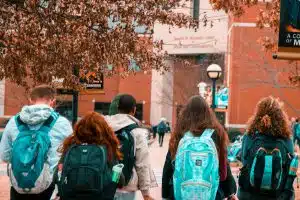A Complete Guide To The USA Biology Olympiad
Many excellent academic extracurricular activities are available to high school students across the United States, including the USA Biology Olympiad (USABO). If you want to learn more about the USABO, you’ve come to the right place.
What is the USA Biology Olympiad?
Every year, the USA Biology Olypiad (USABO), now known as USA Biolympiad, attracts nearly 10,000 of the brightest high school students from across the United States. This top biology competition is open to all U.S. schools and provides the necessary motivation, resources, and skills training to take students’ academic experiences to the international stage.
The competition consists of two challenging examination rounds. Twenty finalists are chosen to attend a residential training program, where they learn advanced biological concepts and hone their laboratory skills before the USABO National Finals.
The final stage of this journey is the selection of four outstanding students who form the USA Biolympiad Team. These students represent team United States at the International Biology Olympiad (IBO), competing with teams from over seventy countries.
Since the Center for Excellence in Education (CEE) took over the administration of the USABO in 2003, every member of the USA Biolympiad Team has secured a medal at the International Biology Olympiad (IBO). In the years 2004, 2007, 2008, 2009, 2011, 2012, 2013, 2015, and 2017, all four team members were awarded gold medals.
Furthermore, the team clinched the Number one position globally in 2007, 2011, and 2013. At the 2023 IBO, held in Al Ain, UAE, the team garnered two gold and two silver medals. Yufei Chen distinguished himself by achieving the Number one Student position globally at the same event. The 2024 International Biology Olympiad is scheduled from July 7 to 14 in Astana, Kazakhstan.
As the Center of Excellence in Education, the official sponsor of USABO puts it:
“The mission of the USABO is to identify, inspire, empower, and support the next generation of life science leaders and to develop their international network. The USA Biolympiad (USABO) stimulates young scholars’ intellectual curiosity and develops their critical thinking in laboratory skills and biological reasoning to propel them to excellence and leadership in science and technology.”
How does the USA Biology Olympiad work?
Now that we’ve discussed what the USABO is about, here are what you should know about the competition format and how it generally works.
To join the USABO, you must register through your school. If your school is affiliated with the USABO, simply contact your teachers or guidance counselors to register. For schools not previously involved in the USABO, registration can be completed here.
Please confirm your host school before registering for the USABO. Each student must register through a host school to participate.
The USABO Online Open Exam is available to all U.S. residents and is a supervised, multiple-choice question (MCQ) based test consisting of 40 questions.
The Open and Semifinal Exams will be conducted online just once by the Art of Problem Solving (AoPS), according to the schedule listed in the online calendar. Students are required to register with AoPS separately. For specific dates related to AoPS registration, please refer to the calendar.
Preliminary Rounds
The top 10% of participants from the Open Exam advance to Round 2, the Online Semifinal Exam. This 120-minute exam demands further qualification, as participants must hold a green card or U.S. citizenship. The exam is structured into three main sections:
- Part A features MCQs.
- Part B presents more intricate MCQs that may require selecting multiple correct answers or interpreting graphs.
- Part C includes a mix of true/false questions, along with short and long answer questions.
Nationals
The top 20 participants from the semifinals earn a spot at the Nationals competition and training program at Marymount University. During a 10-day training session, they prepare for a challenging final phase that includes a 3-hour theory-based paper and 6-hour lab assessments.
The practical paper evaluates laboratory-based skills, techniques, data interpretation, and real-time laboratory competency, testing both conceptual understanding and problem-solving abilities. It comprises multiple true/false questions and MCQs, demanding skills in diagram and graph interpretation, information integration, and data analysis.
The 2024 USABO nationals were held on May 25 – June 5 at Marymount University.
International Competition
Following the National Finals, the four highest-scoring participants are chosen to represent the country at the International Biology Olympiad (IBO). Here, they compete against teams from over 20 countries worldwide.
The IBO 2024 will be held July 7-14 in the beautiful Astana, Kazakhstan.
Overview of the annual USA Biology Olympiad
- Round 1: USABO Online Open Exam
- Round 2: USABO Online Semifinal Exam
- Round 3: USABO National Finals Exam (in-person)
- Round 4: International Biology Olympiad (IBO, in-person)
Who can join the USA Biology Olympiad?
The eligibility requirements for the USA Biology Olympiad (USABO) are straightforward and include:
- High school students from all grades (9 through 12) are eligible to participate.
- High school seniors can participate, provided they have not yet enrolled in an undergraduate program at a college or university.
- Participants must be United States citizens or legal permanent residents of the United States.
- Home-schooled students are also eligible to participate. However, arrangements must be made prior to the official registration closing to allow these students to take the exam at local high schools.
What else should you know about the USA Biology Olympiad?
Key Dates
| Dates | Description |
| April 4, 2024 | Semifinal Exam through AoPS |
| April 25, 2024 | Semifinal Scores Announcement |
| May 1, 2024 | National Finalists Announcement |
| May 25, 2024 | National Finals at Marymount University |
| June 5, 2024 | National Finals Closing Ceremony |
| July 7-14, 2024 | International Biology Olympiad at Astana, Kazakhstan |
| August 1, 2024 | Open registration for USABO 2025 |
| November 8, 2024 | Registration deadline for both students and schools |
| December 4, 2024 | Open registration for Art of Problem Solving (AoPS) |
| December 15, 2024 | Deadline for the $95 fee (for school registration) |
| January 2025 | Registration deadline for AoPS |
| January 2025 | USABO Practice Exam Opens on AoPS Platform |
| February 2025 | Online Open Exam through AoPS |
| March 2025 | Open Exam Scores Announcement |
Identification and Access
After registering, students will receive a unique ID number that grants access to the resources available in the Student Resource Center. This ID number is important as it is required to participate in all USA Biology Olympiad (USABO) exams.
Students must register for a USABO ID# and complete their registration with AoPS before the exam to view their Open and Semifinal scores using this unique ID. This ID number is valid for 1 year.
USABO Online Open Exam
The Open Exam is a 50-minute, online, nationwide multiple-choice test open to any high school biology student in grades 9 to 12 who is registered through a school or one of the select authorized USABO Centers. No U.S. citizenship or green card is required to take this exam; however, advancing to the Semifinal Exam does require one.
The exam is administered and proctored at registered schools or authorized USABO Test Centers during designated dates and times set by the Center for Excellence in Education (CEE). Each question has only one correct answer, and there’s no penalty for guessing.
The top 20% of Open Exam performers are recognized with an Honorable Mention Certificate and a Certificate of Merit for the top 30%. Test administrators can find score cutoffs and download corresponding certificates from the Exam Results section of the Teacher Resource Center.
USABO Online Semifinal Exam
The Semifinal Exam is a 120-minute online test available only to high school students (Grades 9 to 12) who are U.S. citizens or legal permanent residents (green card holders). It consists of three parts:
- Part A primarily features multiple-choice questions with one correct answer
- Part B includes more complex multiple-choice questions that may have multiple correct answers and could require calculations or extensive interpretation of graphs.
- Part C includes both short answer or essay questions and multiple true/false choice questions.
The exam is proctored at a registered school or authorized USABO Test Center, scheduled over a 120-minute period on the designated date and time set by the Center for Excellence in Education (CEE) according to the USABO Calendar.
Only students who score in the top 10% of the Open Exam and who meet the residency requirements are eligible to take this exam. There is no penalty for guessing. In Part B, each question with multiple correct answers will be worth 2 points if all are correctly identified. In Part C, scoring for multiple true/false questions is as follows: 4 correct responses earn 1 point, 3 earn .6 points, 2 earn .2 points, and 1 or 0 earn no points.
Recognition for the Semifinal includes a Recognition of Academic Excellence for the top 50 scores, an Honorable Mention for the next 75 scores, and a Certificate of Merit for the next 100 scores, with certificates mailed to the schools.
USABO National Finals
The National Finals of the USA Biology Olympiad take place at a host university over a 12-day period. They feature 10 days of instruction followed by two days of testing. Students who scored in the top 20 on the Semifinal Exam attend this event.
The Center for Excellence in Education (CEE) acknowledges potential conflicts with high school graduation dates but does not discourage attendance at graduation ceremonies. Special arrangements can be made for students to return home for a maximum of 24 hours, although missing a full day of training can impact a student’s performance in the final exams and practicals.
After the main event, the USA Biolympiad Team remains for two to three days for intensive training and personal instruction in preparation for the International Biology Olympiad (IBO). The instruction focuses on laboratory skills and conceptual understanding, led by university professors and experts, assisted by former USABO Finalists.
The schedule includes field trips, which currently are a mix of virtual and in-person experiences, such as the virtual trip to the Missouri Botanical Gardens. Evenings are free for study, with tutorials provided by teaching assistants who are past USABO or IBO medalists or finalists.
Room and board are provided during the finals, but students are responsible for their own transportation to and from the event. Financial assistance is available through CEE for those in need. Each finalist and their guardian must sign an agreement supporting the finalist’s full participation in the finals and the IBO, and agreeing not to participate in any other national academic Olympiad or summer program during this period.
Lastly, each student must sign an agreement to adhere to USABO rules at the finals. Violations of these rules result in disqualification from receiving certificates or medals and the re-ranking of finalists.
Test Coverage
The USA Biology Olympiad (USABO) exams cover a wide range of topics across multiple areas of biology, including:
- Cell Biology
- Animal Anatomy and Physiology
- Plant Anatomy and Physiology
- Ethology (the study of animal behavior)
- Genetics and Evolution
- Ecology
- Biosystematics (classification of living organisms)
- Neurobiology
- Bioinformatics
These areas are tested to evaluate students’ knowledge and understanding of fundamental and advanced biological concepts.
Should you participate in the USA Biology Olympiad? Is it worth it?
The USA Biology Olympiad (USABO) experience is highly rewarding, especially if you’re a high school student passionate about biology and looking to deepen your understanding of the subject. As you transition to college, involvement in USABO boosts your academic profile and prepares you for college-level biology studies or related fields.
Academic Enhancement and College Preparation
The USABO’s sophisticated curriculum sharpens your mastery of complex biological concepts and practical skills, which are valuable for college-level science courses. The depth of knowledge you gain sets a solid foundation for advanced studies and research.
College Admissions
Participating in competitions like the USABO shows college admissions officers your commitment and excellence in biology. High rankings or awards can make your college application stand out.
Career Exploration
USABO lets you explore various biological disciplines, helping you pinpoint potential college majors and career paths. This exploration is especially beneficial early in your academic journey.
Personal Growth and Skills Development
The preparation process helps develop critical thinking, problem-solving, and analytical skills. These skills are important for academic success, as well as personal and professional life. The competition also teaches discipline and resilience as you balance preparation with regular schoolwork.
Considerations
- Time Commitment: Preparing for the USABO requires significant time and effort, which should be balanced with your schoolwork and other extracurricular activities.
- Pressure and Competition: The competitive environment can be stressful. It’s important to assess how you handle pressure to ensure it’s a healthy and enriching experience.
- Resource Availability: Make sure you have access to necessary study materials and support, such as teachers or mentors who can guide you through the USABO syllabus.
- Financial Resource: Although part of the overall expenses during the national competitions are covered by the USABO, you will still be responsible for a few expenses such as transportation. Be sure that you have this covered before you finalize your decision.
In conclusion, if you are passionate about biology and willing to dedicate time and effort, participating in the USA Biology Olympiad can enhance your personal, academic, and professional growth, making it a valuable endeavor as you look ahead to your college years.
How do you prepare for the USA Biology Olympiad?
The USABO exams preparation requires a strategic approach, combining thorough knowledge acquisition with effective study techniques. Here are practical and effective tips to help you get ready for these rigorous biology competitions:
1. Understand the Exam Structure and Content
- Familiarize yourself with the detailed format of both the open and semifinal exams of the USABO. Know the different types of questions asked, such as multiple-choice, essay, and lab-based problems.
- Study the official USABO syllabus, which outlines all the topics covered, including cell biology, genetics, ecology, and more.
2. Use Quality Study Materials
- Start with standard biology textbooks like Campbell Biology to build a strong foundational knowledge.
- Utilize USABO preparation books and past competition papers to understand the depth and nature of the questions.
- Access resources from the USABO website, including training materials and sample questions.
The Student Resource Corner (SRC) now features updated resources for all seven areas of the International Biology Olympiad (IBO), including useful links, study problems, and additional materials to help prepare for the USABO. In 2021, two new areas, Neurobiology and Bioinformatics, will be added to the SRC.
Additionally, the Biodiversity section now includes images of a common organism for each taxonomic representative prescribed by the IBO. For a more comprehensive list of resources the USABO provides, click here!
Here’s a list of essential textbooks and resources that can help you with your USABO preparation:
- BIOLOGY by Campbell and Reece (preferably the 8th edition or later)
- Human Physiology by Sherwood
- Essential Cell Biology by Alberts
- Plant Biology by Raven
- Botany: An Introduction to Plant Biology, Fourth Edition by James D. Mauseth
- BioEd – an educational platform for life science educators
- MacMillan Learning – offers 106 tutorials on various biology topics
- zeroBiology – provides quizzes, games, worksheets, dissections, and songs for biology students
- Flashcard Database – features sets of biology-related flashcards for effective studying
- Jablonski Diagram Molecular Expressions – features interactive Java tutorials
3. Create a Study Plan
- Dedicate a regular study schedule that allows you to cover all the topics systematically, leaving ample time for revision.
- Break down your study sessions into focused periods, with specific goals for each session.
4. Practice Active Learning
- Engage with the material through active recall and spaced repetition techniques to enhance retention.
- Use flashcards to memorize important concepts and terms.
- Teach the material to a peer or yourself aloud, which can help solidify your understanding and uncover any weak spots.
5. Focus on Weak Areas
- Identify areas where you struggle and devote extra time to these topics.
- Don’t shy away from challenging concepts; instead, tackle them head-on with additional resources like online tutorials or help from teachers.
6. Develop Practical Skills
- For the lab components, if possible, get hands-on practice in a school or local community college laboratory.
- Understand experimental procedures, data analysis, and how to interpret results, which are crucial for the practical exams.
7. Simulate Exam Conditions
- Regularly practice with past papers and mock exams under timed conditions. This helps with time management and also reduces exam-day anxiety by familiarizing you with the pressure of working against the clock.
As you prepare for the USABO, remember that each step you take is moving you toward a promising future in biology. This competition is beyond about winning; it’s about personal growth, gaining new knowledge, and connecting with a community of like-minded peers and mentors. Stay focused on your goals and keep your passion for learning alive.












































